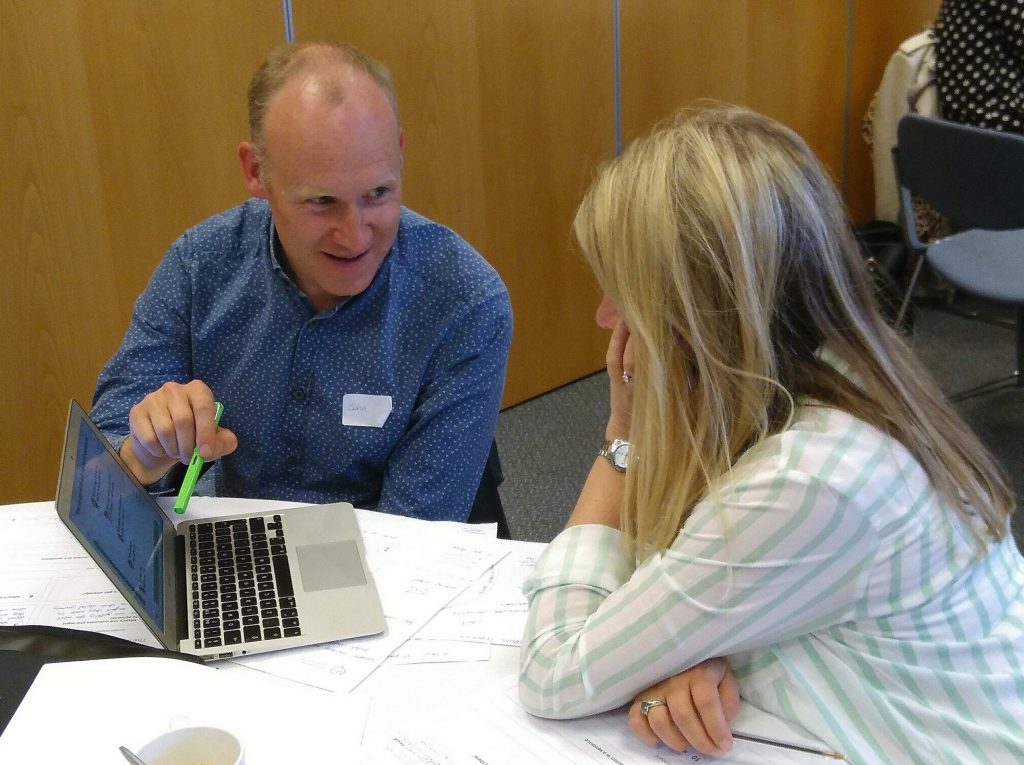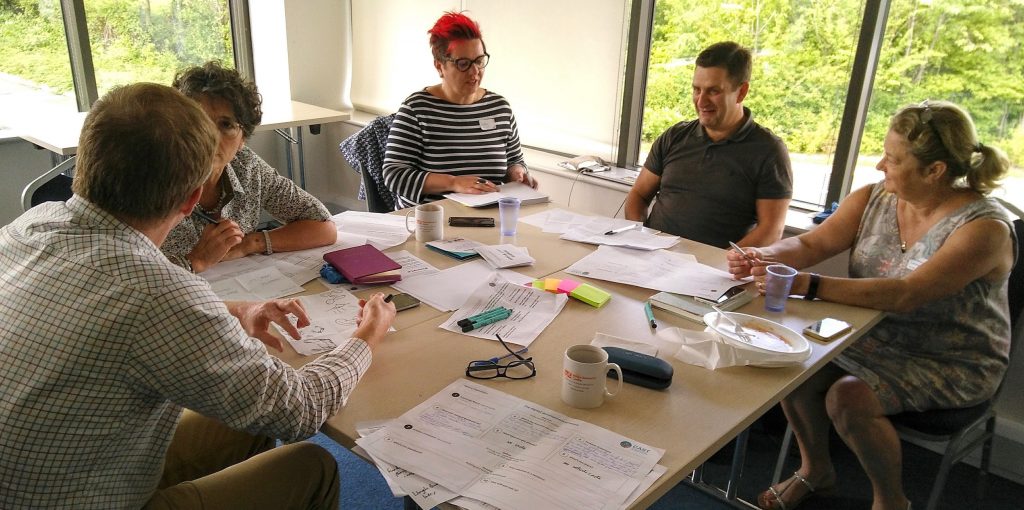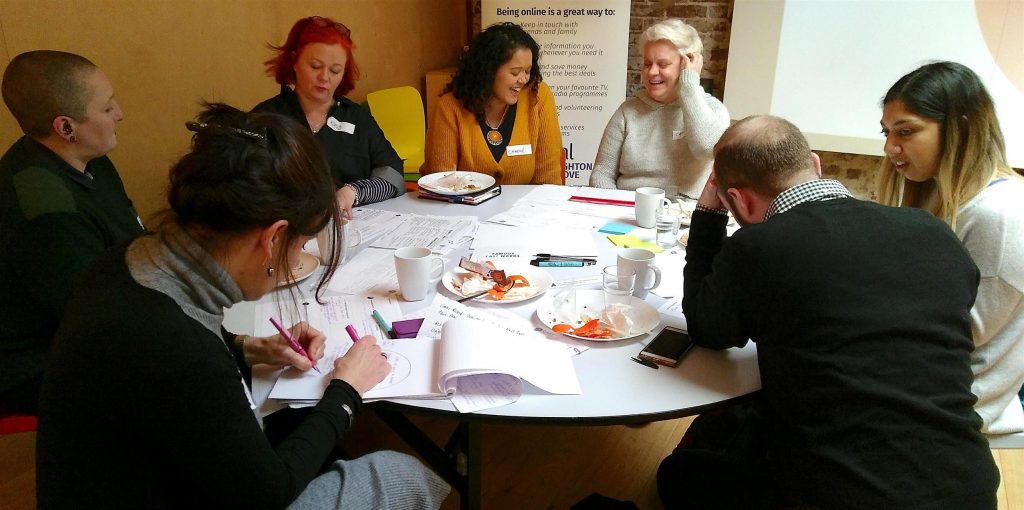Start your digital journey on the right foot with a Design Hop
CAST is running three free ‘Design Hop’ workshops in partnership with SCVO in September, in Inverness, Glasgow and Edinburgh. Read more and sign up here.
Are you keen to understand how ‘digital’ can help improve your organisation’s impact, reach and focus, but not sure where to start?
Over the last eight months, we’ve worked with hundreds of charitable organisations in this position. The potential for charities to be using digital to improve their core service delivery is huge, but some of the best practices in developing digitally-enabled services are relatively new and unfamiliar to our sector.
Our series of free, half-day ‘Design Hop’ workshops introduce and demystify these practices in a straightforward, step-by-step way that’s tailored to the sector. It’s a quick ‘hop’ into this world that gives you templates and exercises you can then repeat with your team. We’re working closely with SCVO to ensure they are particularly tailored to Scotland as well!

What can you expect if you sign up?
Firstly, we’ll send you some pre-reading to help lay the foundations for a productive workshop, and an exercise to do with your team ahead of the day, because it’s really important that engagement with, and responsibility for, digital is spread across more than just one person.
Then the first session takes you through the design process; a tried-and-tested methodology to plan and develop solutions. It includes:
- Unpacking your assumptions around a key service challenge and examining it from the perspective of those that face it
- Understand what assets you have, or can draw on, that might help
- Sketching out potential solutions
- Honing in on one achievable thing to test, and how to test it
- Identifying tangible next steps to move forwards
- A framework for communicating the process to others - we’ve found this helps overcome some of the internal cultural barriers many digital advocates face
- Lunch, tea and coffee to keep you going!
It’s a no-jargon walkthrough of useful techniques, with examples every step of the way of how charities big and small have used them. Attendees have told us these have been helpful for informing the planning, prioritising and decision-making around any service, not necessarily just digital ones. You can read about their experiences and feedback here.

Then what?
This isn’t a one-off event. We hope you’ll be energised and inspired, but what we’re really interested in is helping you embed long-term practice into everyday work. Practice in things like user insight-gathering, testing, reflecting and iterative tweaking, which is what tends to be meant when people say ‘digital culture’. And that stuff takes time.
The first workshop is just the beginning. We’ll support you along the rest of your journey with additional (free) support from The Catalyst network, including local experts, communities and funding opportunities.
We’re also running a follow-up event with SCVO on 10th October for you to come back together with your peers, reflect on your progress and any challenges you’ve encountered, and share and discuss ways to overcome them. We’re all learning together, and while we don’t claim to have all the answers, we can provide a space to explore them collectively.

What does having a digitally-enabled service actually mean?
It could mean providing round-the-clock support to those in desperate need, as abstinence-based recovery charity The Well achieved with a simple peer support WhatsApp group. Instead of having to wait for the next in-person session, service users were able to receive help within 14 seconds of posting a message.
Or it could mean scaling a small, local service to a nationwide resource, as small advocacy charity seAp achieved with their online disability benefits support tool. By iteratively designing and testing with users, starting with tech-free sketches written on paper, they’ve been able to reach over 300,000 people in three years - a 1000x increase in the number of clients supported, for just 10x the investment.
For Scottish Book Trust, digital has been an opportunity to improve accessibility and engagement in their Bookbug programme - a Scottish Government-funded scheme to support every Scottish family with children under five to share stories, songs and rhymes daily. Their free mobile and tablet app, designed closely with families, carers and early years practitioners through multiple interviews, workshops and testing sessions, has had over 17,000 downloads since January this year, and over half a million songs and rhymes already listened to through it. It gives parents and children a chance to engage with technology positively together, and enables the charity to learn about their users’ behaviours and preferences on a continual, real-time basis.

Good use of digital doesn’t have to be big and shiny. In fact, often the most appropriate and effective solutions aren’t (like the WhatsApp group). And no solutions started that way. It can be ambitious, but it doesn’t have to be scary or expensive. And it should absolutely build on the existing assets, knowledge and networks which make social sector organisations so well placed to tackle complex, systemic social challenges.
Join a Hop near you soon to explore what this might mean for your organisation. Sign up now!
- Inverness
5th September, 9.30am-3pm: SCVO training room, Fairways House, Fairways House, Fairways Business Park, Slackbuie Ave, Inverness IV2 6AA
- Glasgow
11th September, 12pm-5pm: Woodland Training Room, GCVS Albany Centre, 44 Ashley St, Glasgow G3 6DS
- Edinburgh
12 September, 9am-2pm: Sir Walter Scott Hall, Grassmarket Centre, 86 Candlemaker Row, Edinburgh EH1 2QA



